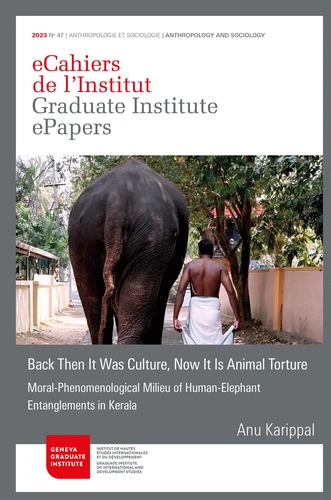Back Then It Was Culture, Now It Is Animal Torture. Moral-Phenomenological Milieu of Human-Elephant Entanglements in Kerala
Par :Formats :
Disponible dans votre compte client Decitre ou Furet du Nord dès validation de votre commande. Le format Multi-format est :
- Pour les liseuses autres que Vivlio, vous devez utiliser le logiciel Adobe Digital Edition. Non compatible avec la lecture sur les liseuses Kindle, Remarkable et Sony
 , qui est-ce ?
, qui est-ce ?Notre partenaire de plateforme de lecture numérique où vous retrouverez l'ensemble de vos ebooks gratuitement
Pour en savoir plus sur nos ebooks, consultez notre aide en ligne ici
- FormatMulti-format
- ISBN978-2-940600-42-7
- EAN9782940600427
- Date de parution16/03/2023
- Protection num.NC
- Infos supplémentairesMulti-format incluant PDF avec W...
- ÉditeurGraduate Institute Publications
Résumé
Interrogating responses and reactions and the atmosphere of fear that my presence instigated, this paper critically examines human-elephant relations in Kerala amidst the bigger debates on animal rights, the emergence of elephants as a flagship species of conservation, and concerns regarding elephant captivity. The paper delves into how elephant handlers and owners reposition themselves and respond to activistic claims that portray human-elephant relations as torturous.
Further, the study calls into question the strict nature-culture/wild-domesticated binaries posed by the activism discourse by probing the fuzzy naturecultures through which elephants and humans navigate their mundane lives. Moving forward, the research proposes that humans and elephants are attuned and entangled through nuanced phenomenological alignments that the normative moral frameworks on elephant captivity seem to overlook.
Deploying various disciplinary and theoretical frameworks, this paper argues that incorporating the ethical turn in anthropology can yield incisive perspectives in interspecies studies. We extend our heartfelt thanks to the Vahabzadeh Foundation for financially supporting the publication of best works by young researchers of the Graduate Institute, giving a priority to those who have been awarded academic prizes for their master's dissertations.
Further, the study calls into question the strict nature-culture/wild-domesticated binaries posed by the activism discourse by probing the fuzzy naturecultures through which elephants and humans navigate their mundane lives. Moving forward, the research proposes that humans and elephants are attuned and entangled through nuanced phenomenological alignments that the normative moral frameworks on elephant captivity seem to overlook.
Deploying various disciplinary and theoretical frameworks, this paper argues that incorporating the ethical turn in anthropology can yield incisive perspectives in interspecies studies. We extend our heartfelt thanks to the Vahabzadeh Foundation for financially supporting the publication of best works by young researchers of the Graduate Institute, giving a priority to those who have been awarded academic prizes for their master's dissertations.
Interrogating responses and reactions and the atmosphere of fear that my presence instigated, this paper critically examines human-elephant relations in Kerala amidst the bigger debates on animal rights, the emergence of elephants as a flagship species of conservation, and concerns regarding elephant captivity. The paper delves into how elephant handlers and owners reposition themselves and respond to activistic claims that portray human-elephant relations as torturous.
Further, the study calls into question the strict nature-culture/wild-domesticated binaries posed by the activism discourse by probing the fuzzy naturecultures through which elephants and humans navigate their mundane lives. Moving forward, the research proposes that humans and elephants are attuned and entangled through nuanced phenomenological alignments that the normative moral frameworks on elephant captivity seem to overlook.
Deploying various disciplinary and theoretical frameworks, this paper argues that incorporating the ethical turn in anthropology can yield incisive perspectives in interspecies studies. We extend our heartfelt thanks to the Vahabzadeh Foundation for financially supporting the publication of best works by young researchers of the Graduate Institute, giving a priority to those who have been awarded academic prizes for their master's dissertations.
Further, the study calls into question the strict nature-culture/wild-domesticated binaries posed by the activism discourse by probing the fuzzy naturecultures through which elephants and humans navigate their mundane lives. Moving forward, the research proposes that humans and elephants are attuned and entangled through nuanced phenomenological alignments that the normative moral frameworks on elephant captivity seem to overlook.
Deploying various disciplinary and theoretical frameworks, this paper argues that incorporating the ethical turn in anthropology can yield incisive perspectives in interspecies studies. We extend our heartfelt thanks to the Vahabzadeh Foundation for financially supporting the publication of best works by young researchers of the Graduate Institute, giving a priority to those who have been awarded academic prizes for their master's dissertations.



